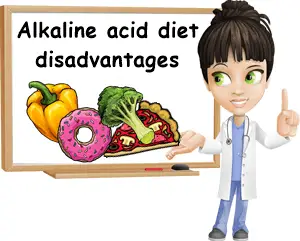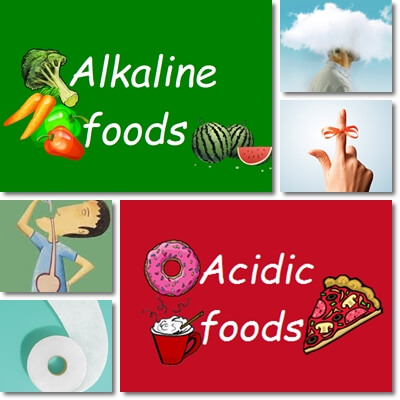The alkaline acid diet refers to eating according to the pH of foods following digestion and in accordance with our blood pH. According to the diet, foods can be classified into alkaline forming and acid forming, meaning the first leave an alkaline trace in the body after digestion, while the latter an acidic or ash trace. Because our blood is naturally slightly alkaline, the diet proposes eating mostly alkaline foods and having a low intake of acid-forming foods. Supporters of the diet say eating this way reduces acidity in the body and promotes good health.
There are numerous benefits attributed to the alkaline diet and range from regulating digestion and improving energy levels to offering antioxidant protection and reducing cancer and chronic disease risks. However, only some of these are real benefits of the alkaline diet. The more spectacular claims have yet to be proven to be a direct result of eating mostly alkaline foods. Moreover, like any dietary regimen, the alkaline diet too has its disadvantages.

The reason why there are side effects to the alkaline diet is because people are different and may respond differently to various classes of foods. Even the healthiest of foods can be good for some of us and bad for others for various reasons. For example, some people may benefit less from including more high-fiber foods in their diet and most alkaline foods are high fiber too. Other people may benefit less from drastically reducing their intake of animal products as the alkaline diet suggests, because they may need a higher B vitamin intake and meat has the richest content of B vitamins.
Although apparently insignificant, some dietary changes such as eating more fruits and vegetables and less meat and dairy (the 80-20 or 75-25 ratio) can negatively impact certain aspects of one’s health and possibly worsen certain conditions. So is it true that the alkaline diet is not so good for some people? Read below to find out the 9 potential side effects of the alkaline diet and the reasons why they occur.
What are the side effects?
1) Diarrhea. It so happens that the majority of alkaline-forming foods are fruits and vegetables, which are also generous sources of dietary fiber. Dietary fiber is generally great for digestive health because it improves intestinal transit time, encouraging effortless, regular and frequent bowel movements. But too much of it can cause poorly formed, mushy stools or diarrhea. And since the diet recommends an intake as high as 75% or 80% of fruits, vegetables and some nuts, it can add up to a lot of dietary fiber. Easing into the diet, especially if you are more of a meat, rice and cheese eater, and choosing your foods carefully to adjust your fiber intake to your body’s requirements can help minimize the risks for diarrhea.

2) Gastritis. Again, most alkaline foods are also a pretty generous source of dietary fiber. And while this may be good for anyone looking to relieve constipation, prevent and manage hemorrhoids and avoid the feelings of unwell due to constipation, it may be problematic for those of us with gastritis. Despite its many benefits, dietary fiber can have an irritating effect on the stomach when consumed in high amounts, moreso when you have gastritis and the stomach lining is already irritated.
If we think about it, most gastritis dietary guidelines advise us to eat more meat such as chicken, some fish (light protein), but also white rice and refined grains, and avoid fruits and fruit juices, high-fiber vegetables (fatty foods and dairy) for a while. This is because too much fiber doesn’t allow the stomach lining to heal, continuing to irritate it and making the condition worse. Because the alkaline diet tells us to up our intake of fruits and vegetables to up to 75% or 80%, which is a lot, gastritis sufferers might not benefit from it at all, risking instead to worsen their condition.
3) Acid reflux. As someone with acid reflux myself, I can honestly say I have to watch what I eat very carefully. And if I were to eat by the alkaline diet, I couldn’t follow it to the letter. For example, certain foods that are healthy according to both the alkaline diet and traditional nutritional standards, are a no-no for acid reflux. Horseradish is a highly alkaline food, but also bad for acid reflux because of its spiciness. And so is ginger, although it’s otherwise quite healthy. Citrus fruits such as tangerines, grapefruit, lime or lemons, also alkaline, can really upset both acid reflux and gastritis. Garlic, onions, chives, bell peppers, cabbage, cauliflower, Brussels sprouts are other examples of alkaline foods which are not very good for gastroesophageal reflux or gastritis.
4) Irritable bowel syndrome. Irritable bowel syndrome is a chronic, long-term condition of the digestive tract causing symptoms such as bloating, flatulence, diarrhea, constipation, abdominal pain in the form or cramps, even anxiety and depression (most likely a result of vitamin and mineral deficiencies caused by problems absorbing nutrients from food). Symptoms may come and go, differ in severity and be brought on by different triggers. Certain foods are particularly bad for irritable bowel syndrome.
In addition to the obvious (carbonated beverages, processed foods, fried and fatty foods), some otherwise healthy foods such as broccoli, cabbage, cauliflower, Brussels sprouts, beans, peas, horseradish, ginger and other spices and a variety of fruits can trigger or worsen the condition (either their spiciness or their high-fiber content is what’s upsetting the condition). The foods listed as examples are also alkaline (see in the alkaline acid charts) which would mean the diet is not necessarily good for someone with irritable bowel syndrome.
5) Hunger. Yes, you feel hungry sooner when on a predominantly vegetarian diet, which is what the alkaline diet basically is. Most of the alkaline foods are fruits and vegetables, which are also low and very low in calories. Seeing that it’s calories that give us energy, we are more likely to burn through what we eat faster than we are used to and feel hungry sooner. This can be inconvenient since we would have to eat more often and maybe more than what we may be used to, requiring us to plan our meals better. But what may be an inconvenience at first for some of us with busier schedules, can prove beneficial in the end because the diet does make us eat healthier, more nutritious foods.
6) Brain fog. Brain fog is associated with forgetfulness, foggy thinking, difficulty comprehending speech and processing information, difficulty focusing, confusion and inability to think straight. One of the potential causes of the condition is nutritional deficiencies. In order to function correctly, our brain needs fats and B vitamins first of all. Both of these nutrients are found in generous amounts in meat, dairy and grains and some people may need more of them than others (as said before, we are all different). But an alkaline diet, which is really mostly vegetarian, restricts the intake of animal products and grains significantly, so it is possible for some people to experience cloudy thinking or brain fog as a result.
For example, I often experience severe brain fog and crave pork, eggs, mayonnaise and other fatty foods intensely after spending several hours working at the computer. I literally cannot think clearly if I don’t eat something fatty like that. As soon as I do, as soon as let’s say 10 minutes, I feel my thinking getting back to normal and I can focus. If I try to eat anything else, nuts or seeds, fruits or vegetables, I remain incapable of thinking clearly and I am simply useless.
7) Mood changes. Not getting all the nutrients we need in the amounts we need them can impact various aspects of our health. For example, meat, dairy and even grains contain important nutrients such as amino acids and B vitamins we need for normal brain function. Such nutrients are responsible for synthesizing neurotransmitters and hormones that affect thinking, appetite, sleep and even mood. It is possible that a diet restricting animal products can result in some people not meeting their minimum intake of certain nutrients such as B vitamins which could indirectly lead to bad mood, especially since a good disposition is a sign of good health.
8) Risk for anxiety and depression. Certain nutrients are of extreme importance for mental health and being severely deficient in them can lead to anxiety and depression. For example, it is possible for a poor disposition and a tendency for anxiety and depression to be a result of an insufficient intake of B vitamins. Because the alkaline diet significantly limits our intake of animal products, which are our richest source of dietary B vitamins, essential for brain and nervous system health, it can lead to or accentuate anxiety and even depression symptoms (see Anxiety: Causes, Symptoms and Treatment).
Also, a too high intake of fiber can accentuate nutritional deficiencies by lowering the absorption of minerals such as magnesium, increasing depression and anxiety risks. Some plant based foods contain anti-nutrients such as phytic acid which further reduces mineral absorption. Phytic acid binds to iron, zinc, calcium in particular.
9) Taking in more pesticides. Because the alkaline diet is predominantly vegetarian, it means we eat more fruits and vegetables. And because different parts of the world have different regulations concerning the amount and type of pesticides used on various crops, there is always the risk of taking in more pesticides than it would be safe to. In reality, it’s extremely difficult to test all the food reaching our dinner table and there have been reports of foods containing five or even twenty times more pesticides than normal, so there is always this risk with a predominantly vegetarian diet, unless we eat organic.
Conclusion
No dietary regimen is perfect for everyone, the alkaline diet included. And this is not necessarily because the diet is bad, but because we are all different and may respond differently to various foods, irrespective of how healthy they are. This is why the same alkaline foods that help improve transit, prevent constipation, regulate digestion and boast a probiotic action may cause diarrhea, acid reflux, worsen gastritis and irritable bowel syndrome. Learning to adjust the diet to individual nutritional needs and choosing foods that work for us is crucial for avoiding its side effects.
